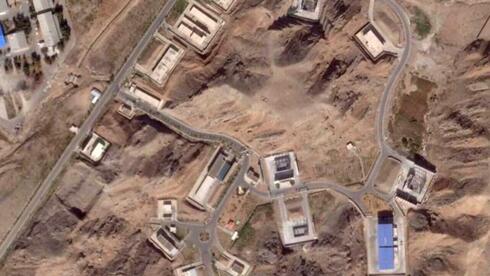
Iran starts rebuilding missile sites hit by Israel, but experts say a key component is missing.
Tehran rebuilds missile-production sites hit by Israel during the June fighting round with Israel, but satellite imagery and experts suggest it still lacks critical planetary mixers needed for solid-fuel production; expert fear China can help restock munitions.
Iran has begun rebuilding missile-production sites targeted by Israel during its 12-day war in June, satellite images analyzed by The Associated Press show, but a key component is likely still missing — the large mixers needed to produce solid fuel for the weapons.
Reconstituting the missile program is crucial for the Islamic Republic, which believes another round of war with Israel may happen. The missiles are one of Iran’s few military deterrents after the war decimated its air defense systems — something that Tehran long has insisted will never be included in negotiations with the West.
Missile experts said that obtaining the mixers is a goal for Tehran, particularly as it prepares for possible United Nations sanctions to be reimposed on the country later this month. The sanctions would penalize any development of the missile program, among other measures. Iranian President Masoud Pezeshkian is due to address the United Nations General Assembly on Wednesday.
Known as planetary mixers, the machines feature blades that revolve around a central point, like orbiting planets, and offer better mixing action than other types of equipment. Iran could purchase them from China, where experts and U.S. officials say they’ve purchased missile fuel ingredients and other components in the past.
Iran may choose to rely on China to obtain mixers and the chemicals to make solid fuel. Such chemicals may have caused a massive explosion in April that killed at least 70 people at a port in Iran. Iran still has not explained the blast, which happened as its diplomats met with Americans in Oman over its nuclear program.
Just days after the explosion, the U.S. State Department sanctioned Chinese firms it said provided the Islamic Republic with “ballistic missile propellant ingredients.”

Satellite images showing Iranian reconstruction of missile pads (Photo: Planet Labs PBC / AP)
Meanwhile, Iran’s Revolutionary Guard likely supplied a planetary mixer to an underground ballistic missile construction facility in Syria near the town of Masyaf, some 170 kilometers (105 miles) north of the capital, Damascus, near the Lebanese border. Footage released by the Israeli military months after the September 2024 raid on the facility showed the mixer, which bore a resemblance to others sold online by Chinese firms.
Iran’s president and military officials visited Beijing earlier this month for China’s Victory Day parade. Iran’s government has provided no detailed readout on what Pezeshkian said to Chinese President Xi Jinping, and China’s state-run media offered no indications that Tehran asked for help.
The Chinese Foreign Ministry, asked about possibly supplying Tehran mixers and fuel ingredients, said that Beijing is “willing to continue leveraging its influence to contribute to peace and stability in the Middle East.”
“China supports Iran in safeguarding its national sovereignty, security and national dignity,” the ministry said. “At the same time, China is deeply concerned about the continued escalation of tensions in the Middle East.”
Can Kasapoğlu, a senior fellow with the Washington-based Hudson Institute, said Beijing could supply guidance systems and microprocessors as well for Iran’s ballistic missiles. “If Iran uses its relationship with China to bolster its disruptive military capabilities, the 12-day war could be a mere speed bump for the Iranian regime, rather than a decisive defeat,” he wrote.
Lair, the analyst, said if Iran restarts its production at prewar levels, the sheer number of missiles produced will make it harder for the Israelis to preemptively destroy them or shoot them down. “They are clearly very invested in their missile program, and I don’t think that they’re going to negotiate it away, ever,” he said.
© 2025, GDC. © GDC and www.globaldefensecorp.com. Unauthorized use and/or duplication of this material without express and written permission from this site’s author and/or owner is strictly prohibited. Excerpts and links may be used, provided that full and clear credit is given to www.globaldefensecorp.com with appropriate and specific direction to the original content.





